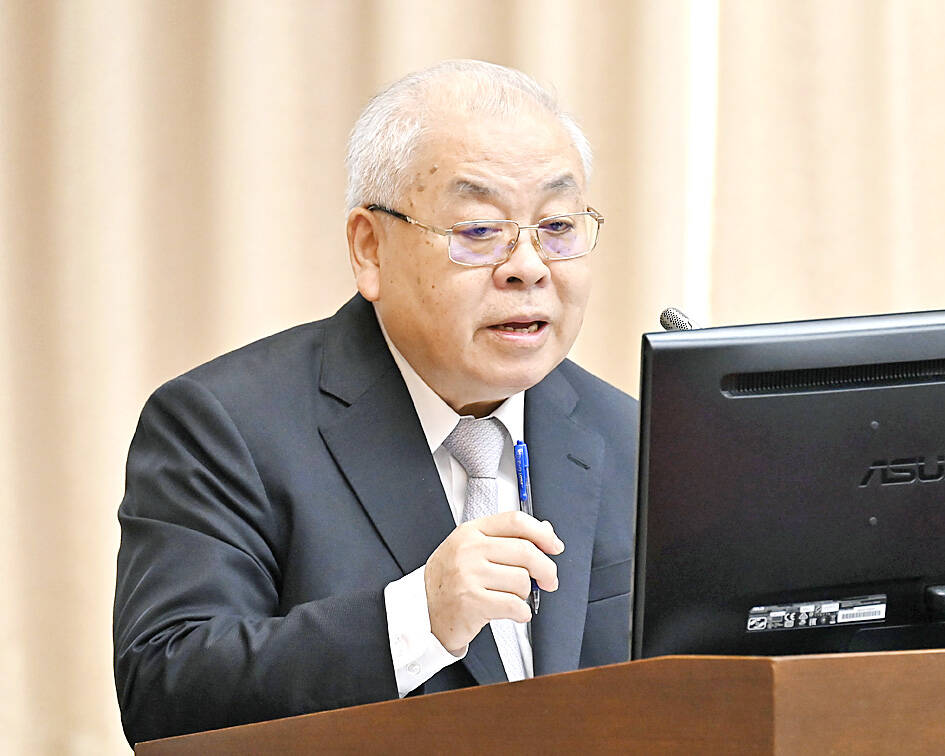The Directorate-General of Budget, Accounting and Statistics might next month cut its forecast of GDP growth for this year again, from the 1.6 percent it projected in August, as major economic data have been weaker than expected, DGBAS Minister Chu Tzer-ming (朱澤民) said yesterday.
Chu shared the conservative outlook at a meeting of the Legislative Yuan’s Finance Committee, where he said the DGBAS review committee would update its growth projection next month.
A downward revision is likely, given that major bellwethers were below par, he said.

Photo: Tu Chien-jung, Taipei Times
Export orders, industrial production, private investment and other GDP components remain in negative territory, although exports grew slightly last month, government data showed.
“The growth forecast of 1.6 percent was made in August... Research institutes at home and abroad have recently projected growth of 1 to 1.5 percent,” Chu said during a question-and-answer session.
Full-year showings look a bit softer than previously expected, but revisions would have to wait until all figures are in, he said.
However, Chu said he disagreed with the IMF changing Taiwan’s GDP growth forecast to 0.8 percent for this year.
“The final numbers will prove higher than 0.8 percent, in the absence of major external shock,” he said.
If the Israel-Hamas war escalates and involves oil exporting countries, which would drive up international oil prices, GDP growth of 1 percent is overly optimistic for Taiwan, as it imports more than 90 percent of its oil, Chu said.
The minister avoided speculating about the consumer price index (CPI), except to say the inflationary gauge is unlikely to drop to 1 percent in the near future after rising above 2 percent for three straight years.
Central bank Governor Yang Chin-long (楊金龍) recently said that the CPI would hover around 2 percent for a while, restricting room for monetary easing to support the economy.
Chu said he agreed that the government is responsible for the inequitable distribution of social wealth and resources, and it could narrow the gap between rich and poor.
The government could achieve this by adjusting income taxes, expanding social welfare spending and increasing wages, the minister said.
Increasing social welfare spending appears to be the most effective measure, because raising income taxes would scare away foreign investors, Chu said.
The government set aside NT$713 billion (US$21.99 billion) for social welfare this year, up 55 percent from NT$460 billion in 2016, Chu said.
The Ministry of Finance said that Taiwan’s wealth distribution is relatively fair, with 3.05 million wage earners, or 47 percent, spared from paying personal income tax.

Intel Corp chief executive officer Lip-Bu Tan (陳立武) is expected to meet with Taiwanese suppliers next month in conjunction with the opening of the Computex Taipei trade show, supply chain sources said on Monday. The visit, the first for Tan to Taiwan since assuming his new post last month, would be aimed at enhancing Intel’s ties with suppliers in Taiwan as he attempts to help turn around the struggling US chipmaker, the sources said. Tan is to hold a banquet to celebrate Intel’s 40-year presence in Taiwan before Computex opens on May 20 and invite dozens of Taiwanese suppliers to exchange views

Application-specific integrated circuit designer Faraday Technology Corp (智原) yesterday said that although revenue this quarter would decline 30 percent from last quarter, it retained its full-year forecast of revenue growth of 100 percent. The company attributed the quarterly drop to a slowdown in customers’ production of chips using Faraday’s advanced packaging technology. The company is still confident about its revenue growth this year, given its strong “design-win” — or the projects it won to help customers design their chips, Faraday president Steve Wang (王國雍) told an online earnings conference. “The design-win this year is better than we expected. We believe we will win

Chizuko Kimura has become the first female sushi chef in the world to win a Michelin star, fulfilling a promise she made to her dying husband to continue his legacy. The 54-year-old Japanese chef regained the Michelin star her late husband, Shunei Kimura, won three years ago for their Sushi Shunei restaurant in Paris. For Shunei Kimura, the star was a dream come true. However, the joy was short-lived. He died from cancer just three months later in June 2022. He was 65. The following year, the restaurant in the heart of Montmartre lost its star rating. Chizuko Kimura insisted that the new star is still down

While China’s leaders use their economic and political might to fight US President Donald Trump’s trade war “to the end,” its army of social media soldiers are embarking on a more humorous campaign online. Trump’s tariff blitz has seen Washington and Beijing impose eye-watering duties on imports from the other, fanning a standoff between the economic superpowers that has sparked global recession fears and sent markets into a tailspin. Trump says his policy is a response to years of being “ripped off” by other countries and aims to bring manufacturing to the US, forcing companies to employ US workers. However, China’s online warriors